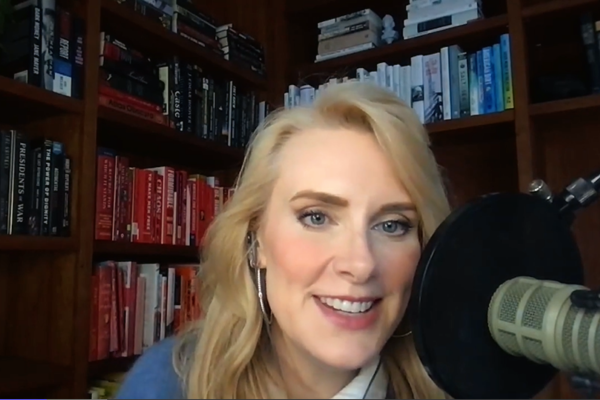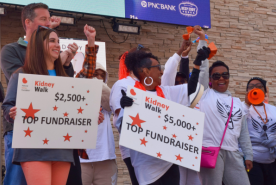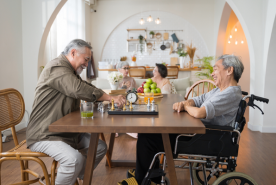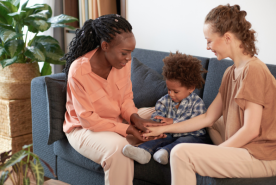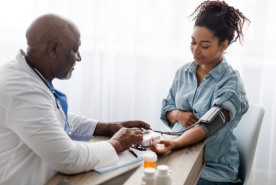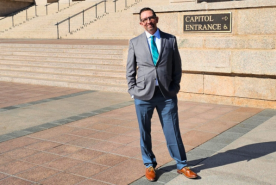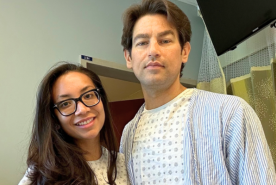January 25, 2024
Sharon McMahon's commitment to truth and the democratic processes that shape the US gave her the online title of America's Government Teacher®. By sharing non-partisan facts and encouraging advocacy under her social media platform, @SharonSaysSo, she's built a caring community called Governerds. Together, they've raised millions to help people in need across the country. Now the Governerds are raising awareness for another important topic–kidney disease and living kidney donation.
A shocking kidney failure diagnosis
[VIDEO::http://www.youtube.com/watch?v=55fq3m5786U::aVideoStyle]
Sharon’s husband, Chris, went to his annual healthcare checkup without thinking much of it. When his labs revealed his kidneys were failing, everyone assumed it was a lab error.
“He repeated the test a week later and it was the same. After an emergency appointment with a nephrologist, we learned his only option was a kidney transplant.” Sharon said, “His kidney function was so low that there was no coming back from it.”
The surprise stage five kidney failure diagnosis shocked the family. But that didn’t stop Sharon from jumping into action. She began the process of becoming his direct kidney donor.
“The kidney donation evaluation gives you a clear picture of your health. I was a good candidate, with one small caveat,” said Sharon. “I had a tiny kidney stone in one of my kidneys. I have never had symptomatic kidney stones so I had to do further testing. They wanted to make sure I could live a long, healthy life with my remaining kidney.”
After the tests, a nutritionist designed a kidney-stone diet. If this resolved the kidney stone, Sharon would know which foods to limit in the future. It would also mean that Sharon could donate a kidney.
At the same time, Sharon’s mother was getting tested for a paired donation or donor chain. In a paired donation, the donors aren’t a match for their intended recipients, so they “swap” recipients. A chain is similar, but it is started by a donor who doesn’t know the recipient.
“Our transplant team cautioned against me donating. We didn’t live near the transplant center, someone needed to work, and care for our children and my husband.” Sharon said, “We were lucky my mom was approved even though she wasn’t a match for. She spent her entire life under-salting food. We used to tease her but, in her 60s, she has the kidneys of somebody half her age.”
While the family waited for a potential pair, Sharon continued her kidney stones diet. Then COVID-19 struck.
Do you need a kidney transplant? Take our "First Steps to Transplant" course to learn everything you need about the process.
COVID-19 complications
When the pandemic began, transplants were viewed as an elective surgery. As a result, transplant centers around the country closed for several months. When the program did reopen, it was diminished.
“Our children couldn’t come to see their dad, you had to be careful with your health, and wear masks. That wasn't the hard part. The scariest part was that there were no treatments available. There were no vaccines, monoclonal antibodies, or antivirals,” said Sharon. “Our team told us he had a 30% to 50% chance of dying or losing the transplanted kidney from COVID-19.”
With this information, the McMahons decided to move forward with Sharon’s mother as the donor. Should something happen to Chris, Sharon would be there to care for their children.
As they waited for a match, Chris grew sicker.
“We decided to manage his symptoms but he was extremely sick by the end,” said Sharon, “It was very challenging but he managed to get away avoiding dialysis.”
A year passed before The McMahons got the call that would change their lives.
“In July 2020, his transplant team told us that my mom and husband could take part in a donor chain,” said Sharon. “The kidney stones will be addressed in the future so I can donate should my husband need another kidney in fifteen years or so.”
Want to learn more about living kidney donation? Take our "Becoming a Living Donor" online course which teaches you everything you need about becoming a living kidney donor.
Two life-changing transplants
With the match found, the surgery was scheduled.
“My mom donated her kidney on the same day at the same medical facility where my husband received his transplant. We’re three years out and he is doing quite well. His kidney is performing and he’s tolerating his medicine regimen. He couldn’t have a better clinical outcome from the organ donation.” Sharon said, “The surgery recovery wasn’t fun for my mom. It took some time for her body to adjust to one kidney but it did. Today she is in great health.”
Despite the initial difficulties, Sharon’s mother would make the same choice in a heartbeat.
“She ensured her grandchildren would grow up with their dad by participating in the donor chain,” said Sharon. “She considers her donation a small sacrifice that she was happy to make.”
After this experience, Sharon has been using her platform to raise awareness about kidney disease and living donation. The results were tangible–at least five of her followers altruistically donated their kidneys because of Sharon’s story.
“My husband and mom agreed to let me share their stories. It's a small thing I can do to bring awareness to kidney disease and increase advocacy. Kidney donors need protection against insurance discrimination. They deserve resources,” Sharon said. “As a result, several of my community members donated a kidney to strangers. It's been gratifying to see the number of people interested in advocating for changes that will benefit the system, recipients, and donors.
Take action now to support the Living Donor Protection Act. Your support helps ensure living donors can give the gift of life without fear of insurance discrimination.
